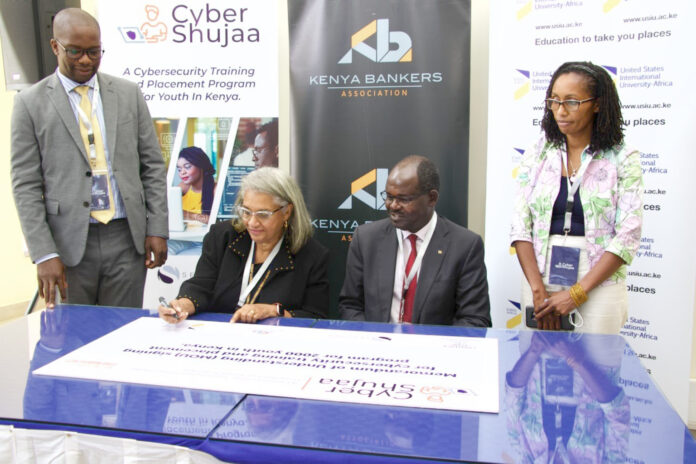Kenya’s cyber security space has received a major boost today after USIU-Africa, Kenya Bankers Association and Serianu unveiled an industry-led training program to add 2,000 professionals into the space.
Known as Cyber Shujaa, the training program intends to develop and implement a harmonized cybersecurity employment framework linking the industry and the training institutions.
It targets to bring 1,000 women on board as cybersecurity professionals and to support at least 30 young people as cybersecurity entrepreneurs.
Speaking during the signing of the Memorandum of Understanding between the consortium members, the Vice Chancellor, USIU-Africa, Professor Freida Brown reiterated the University’s commitment to action research which calls for interventions and co-creation of knowledge with stakeholders.
“This project enhances our university-industry-government-civil society linkages to promote similar future partnerships. This project will brand itself to become a cybersecurity institute to offer a nationally recognized certification in the area of cybersecurity,” said Brown.
While the shortage of skilled cyber security experts is a global challenge that experts say requires 2 million new practitioners, at the local level it is equally severe, with Serianu research showing that Kenya needs to hire at least 1,000 new experts annually.
“The shortage of skilled cybersecurity professionals has become alarming. We recognized that a multi-agency approach to creating a pathway for learners to transition into the industry as practicing cybersecurity executives is key to bridging the local skills gap,” said William Makatiani, the Chief Executive Officer of Serianu.
Makatiani pointed out that the firm’s research had established that Kenya’s burden of burgeoning cybercrime, estimated at Sh10billion in annual losses, was exacerbated by a severe lack of sufficient well-trained cybersecurity executives.
“With more women taking up ICT courses at the tertiary learning institutions, we are convinced that the partnership we have founded with USIU-Africa and Kenya Bankers Association will accelerate the growth of our national cyber professional expert base,” added Makatiani.
The firm found in its 2019 cybersecurity survey that only 10 per cent of practicing cyber security professionals are women, yet they are immensely interest in pursuing the career.
Through the consortium, Kenya Bankers Association will provide the market intelligence that informs the curriculum development, USIU-Africa will design the curriculum and ensure the youth are at the heart of the program while Serianu will provide the technical training and practical immersion.
Outlining the industry practical fit for the program, Kenya Bankers Chief Executive Officer Habil Olaka said that the financial services sector was a key interested party in its success owing to the nature of their business and the fact that it touches every sphere of the economy.
“While the uptake of these platforms continues to support financial inclusion across demographics, cases of digital fraud have also increased. Increasingly, fraudsters continue to target vulnerable users through identity theft, social engineering, and phishing emails, among other forms of fraud that exploit low levels of awareness on the part of consumers. The evolving fraud trends threaten gains that have been achieved in the economy over the past decades, making it necessary for stakeholders to work together towards containing it,” said Olaka.



